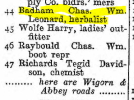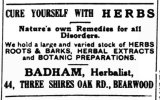Stokkie
master brummie
Anyone remember or use this shop which was situated before the junction with Wigorn and Abbey Road? It looked old fashioned. Mom bought Orris root from there sometimes and Liquorice root which we chewed as a sweet. I remember using orris to make potpourri with rose petals from the garden. It was a medicinal herbalist which operated in the 1960s - and probably before too. I have a vague recollection that the herbalist was prosecuted.(But I could be entirely wrong here). Mom used a few folk remedies, roasting an onion to hold to your ear for earache. Quite soothing. But she went to the doctors (also in Three Shires Oak) for medical conditions.
Last edited:



